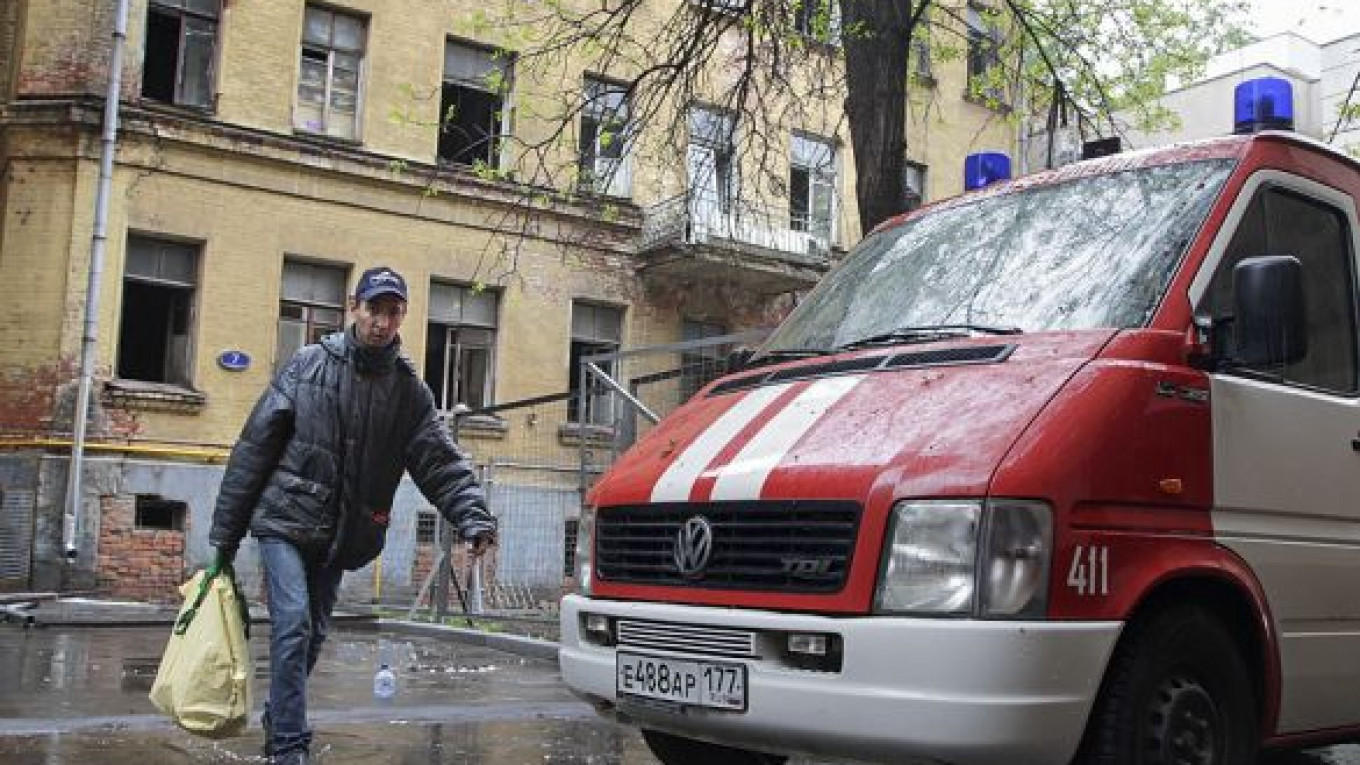A fire ravaged a ramshackle residential building on Bolshoi Afanasyevsky Pereulok outside the Kropotkinskaya metro station early Tuesday, killing seven and injuring at least five, most of them migrant workers.
Survivors calmly packed their belongings and trudged away, but whether they would find safer residency was doubtful.
The incident, not the first of its kind, indicates that there is still no solution for the problem of migrant housing — which a former city prefect blamed on corrupt officials closing their eyes to safety violations.
The fire started around 6 a.m. in the basement of a three-story brick building, the Emergency Situations Ministry said. A City Hall source told Interfax that the building had been scheduled for demolition since 2003.
The building still housed nationals of Russia, Tajikistan and Kyrgyzstan, Federal Migration Service spokeswoman Zalina Kornilova told Interfax. The City Hall source said the building housed three families, without elaborating. The reports could not be immediately reconciled.
Firefighters, who arrived minutes after being informed about the blaze, managed to save 20 residents, five of whom were hospitalized, including two children, the ministry said.
Four of the injured, including both children, were Kyrgyz natives were being treated for burns and smoke inhalation, Kyrgyzstan's Interior Ministry said, RIA-Novosti reported.
Seven dead bodies were discovered under the rubble in the basement, the ministry said. None of them were identified Tuesday.
The fire destroyed most of the basement as well as wooden beams and the roof of the building, which was constructed in 1908, the ministry said. It took 64 firefighters to extinguish the blaze.
Unidentified local residents told Komsomolskaya Pravda that they suspected arson. But the ministry said it suspected that an open fire or the mishandling of an electric cooker probably caused the blaze, adding that an investigation had been opened.
Meanwhile, the employers of those who died could face up to five years in jail for bringing illegal migrants into the country, Kornilova told Interfax, without elaborating.
The residents worked as janitors elsewhere in the city, a migrant told The Moscow Times outside the building hours after the fire. He refused to identify himself and said he had not lived at the building.
Several migrants were packing their belongings in plastic bags by the building early Tuesday afternoon. One threw possessions out a second-floor window, while others caught them and carried them away, some to the utilities room of a neighboring apartment building, supervised by a middle-aged woman of Slavic appearance, and others elsewhere.
The only indications of the fire were sooty stains outside the broken basement windows and an improvised rope of motley clothes and linen reaching to the ground from a second-floor window.
A district court limited use of the building for three months in 2008 over fire safety violations, the Emergency Situations Ministry said, adding that unspecified officials were disciplined over the violations in February, implying that the problems were not fixed.
Now the building's management may be charged with involuntary manslaughter, punishable with up to four years in prison, over the seven deaths, the City Hall source said.
This is not the first time that dilapidated housing used by migrants has been engulfed in flames in Moscow. In 2009, seven Tajik workers died when a fire broke out in an underground parking garage where they had been living illegally.
District police usually know about people living in decrepit nonresidential buildings but close their eyes to violations in exchange for bribes from local officials, former Moscow prefect Oleg Mitvol told the Svobodnaya Pressa web site.
Officials save up and pocket municipal money by refusing to provide adequate housing to migrants, Mitvol added.
A Message from The Moscow Times:
Dear readers,
We are facing unprecedented challenges. Russia's Prosecutor General's Office has designated The Moscow Times as an "undesirable" organization, criminalizing our work and putting our staff at risk of prosecution. This follows our earlier unjust labeling as a "foreign agent."
These actions are direct attempts to silence independent journalism in Russia. The authorities claim our work "discredits the decisions of the Russian leadership." We see things differently: we strive to provide accurate, unbiased reporting on Russia.
We, the journalists of The Moscow Times, refuse to be silenced. But to continue our work, we need your help.
Your support, no matter how small, makes a world of difference. If you can, please support us monthly starting from just $2. It's quick to set up, and every contribution makes a significant impact.
By supporting The Moscow Times, you're defending open, independent journalism in the face of repression. Thank you for standing with us.
Remind me later.






